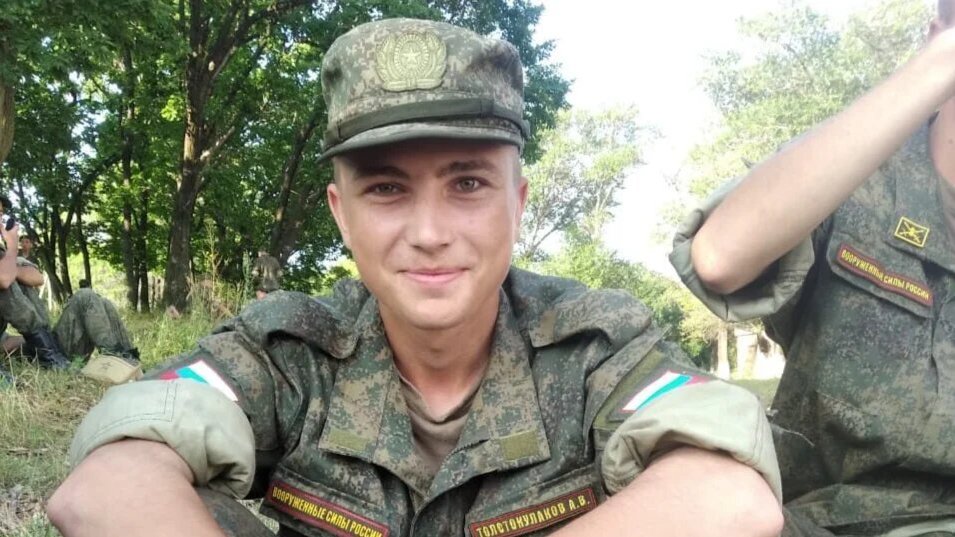“When he was leaving to go there, his grandpa told him: ‘Lyosha (short for Alexey — translator’s note), don’t be a hero, come back home.’ And he said: ‘Grandpa, everything will be alright, I’ll come back.’ And now he came back!” Tatyana Dekhonova, the aunt of 20-year-old Russian soldier Alexey Tolstokulakov who was killed in Ukraine, recalls. She talks about him in third person and practically never calls him by name, as if she cannot believe that her nephew, such a friendly young man who always had a smile on his face, is gone.
The last time she spoke to Alexey was on 10 April. By that time, no one had heard from him for nearly a month, and his worried relatives called the Russian Defence Ministry hotline. Soon after that, they got a call from Alexey. The junior sergeant told them in a cheerful voice that everything was fine, and that it was very warm “here” — everyone was wearing summer clothes, he said. The phone call lasted for about a minute. On the same day, at about 11 p.m., he sent a text to his aunt Tatyana Dekhonova: “If there is hell on earth, we are here. I’m still alive, but not for long. Help me.” It was late at night in Russia’s Amur region, where his family is from, so Tatyana only saw the message in the morning of 11 April. Nine days later, Alexey will would be killed. A week after that, the army would inform his family about his death, promising to give them 90,000 rubles for the funeral.
Exactly ten months had passed since the day Alexey was drafted in the army until his funeral. This is the story of how a 20-year-old conscript ended up participating in the special operation and got killed there, told by his aunts Tatyana Dekhonova and Maria Perova, as well as Alexey himself, through the messages he sent to his family while he was still alive.
The draft
“He took the military oath on 8 August [2021], and in the days leading up to it, they approached him asking to sign up for contract service, even forcing him to do it,” Tatyana says.
Alexey was drafted into the army on 5 July, right after he graduated from a college in Belogorsk, a town in the Amur region. He got a car technician degree and came back home, to the settlement of Yerofey Pavlovich, or simply Yerofey, as locals refer to it.
Tatyana and her sister Irina, Alexey’s mother, travelled over 1,200 miles to see him take the oath at his military unit in Sergeevka, a settlement in Russia’s Far East, not far from Ussuriysk, where the 127th Motor Rifle Brigade was stationed. He was to serve as a driver of an infantry fighting vehicle, as he got his driver’s license while he was still in college.
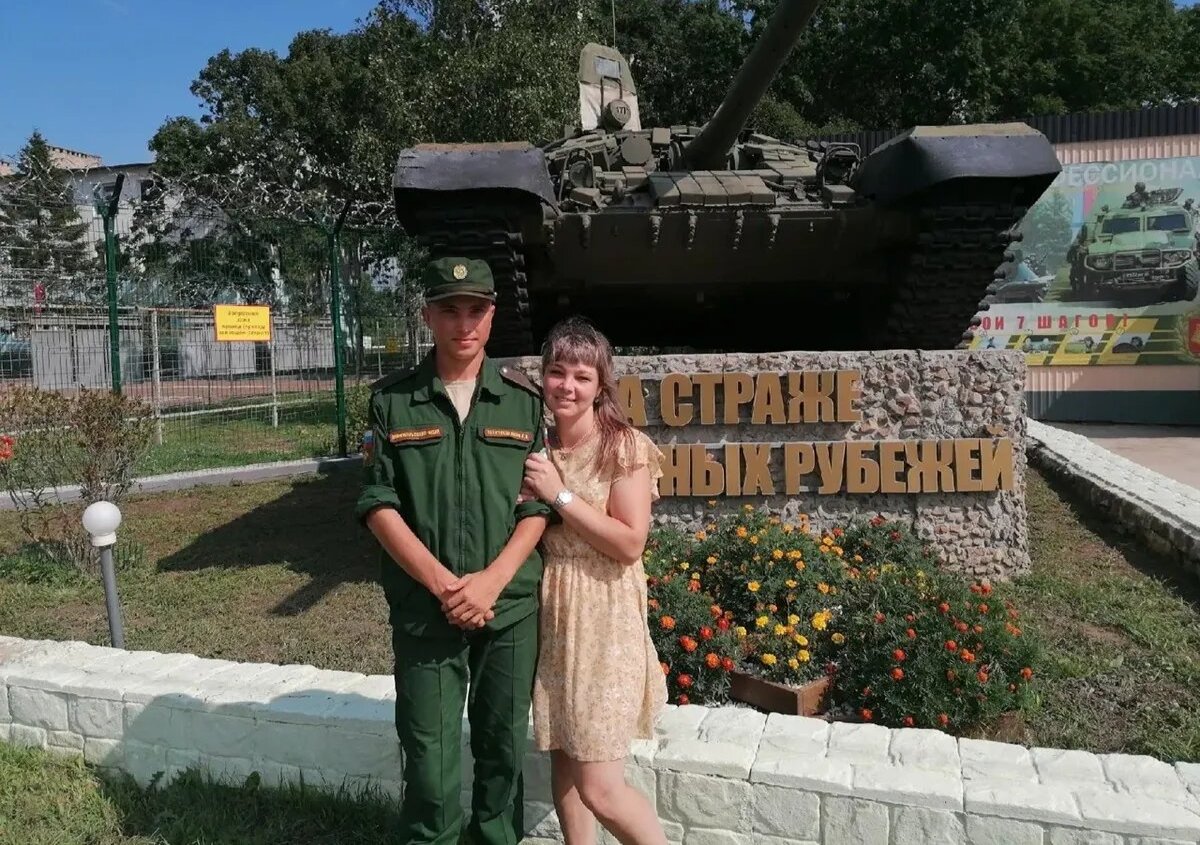
Alexey on the day of his military oath. A photo from the family archive
Alexey told them that he had agreed to sign up for contract service. His mother and aunt advised him to take some time to think about it. “We didn’t try to talk him out of it, we just told him: ‘Think about it, you’ve still got time, there’s a whole year left to serve, you can sign a contract at any time,’” Tatyana says. Alexey decided to take his family’s advice and refused to sign a contract back then.
The women visited his military unit, which seemed “okay” to them. They talked with the commanders of the unit who gave them a tour of the premises. “They let us visit the canteen to see what food they were given. Everything was pretty clean,” Tatyana recalls. “Alexey did not have any complaints either. He liked tinkering with cars. [While he was in college], he worked at a car depot. He wanted to work as a car mechanic, he didn’t want to be a professional soldier,” Tatyana stressed.
Nevertheless, after the sisters came back home, they found out that Alexey had decided to sign a contract after all. Tatyana remembers the date his contract service officially started: 18 December. According to Russian law, conscripts can sign a contract with the military only after three months of service. So, he could not officially sign a contract in August. But they could still get his informal agreement.
The war
“We’re writing reports,” Alexey wrote to the family group chat on Telegram. He sent a picture of a printed document template: some of the words were barely seen, as the printer was running low on toner. The document was addressed to the commander of Military Unit 25573, the number assigned to the 394th Motor Rifle Red Banner Regiment, which forms part of the 127th division. It said: “I, senior shooter of X branch/company/unit Ivanov Ivan Ivanovich, am ready to voluntarily carry out special objectives,” followed by the date, the soldier’s rank, signature and surname.
The picture sent by Alexey had a low resolution, so Tatyana asked her nephew what the document said. “It’s a report saying that I agree to carry out special objectives,” Alexey replied. He used the name Alexey Ivanov on Telegram: soldiers are forbidden from using their cell phones in the army, so they often use fake names when texting their relatives.
Tatyana asked Alexey if he could say no. “I can, but I don’t want to,” her nephew replied.
Shortly before that, he called his family and told them that he would be sent to the “special operation” in Ukraine: they would pack their things on 3 March and leave the next day. Some of the units were sent to the active combat zone in late February.
Alexey did not explain why he did not want to refuse. Tatyana says that he had access to the Internet: he read the news about the war and shared it with his family.
“I didn’t ask him why. Maybe he and the other boys didn’t think it would be that scary there. Maybe they thought that it would be like the competition in Sibirtsevo there [in Ukraine],” Tatyana suggests.
Before the war, Alexey told his family that they had taken part in a competition or military exercises in Sibirtsevo, where his team got second place. Sibirtsevo is a settlement about 50 miles away from Sergeevka, where the 60th Motor Rifle Red Banner Brigade (Military Unit 16871) is stationed. Tatyana says that Alexey really enjoyed the drills in Sibirtsevo.
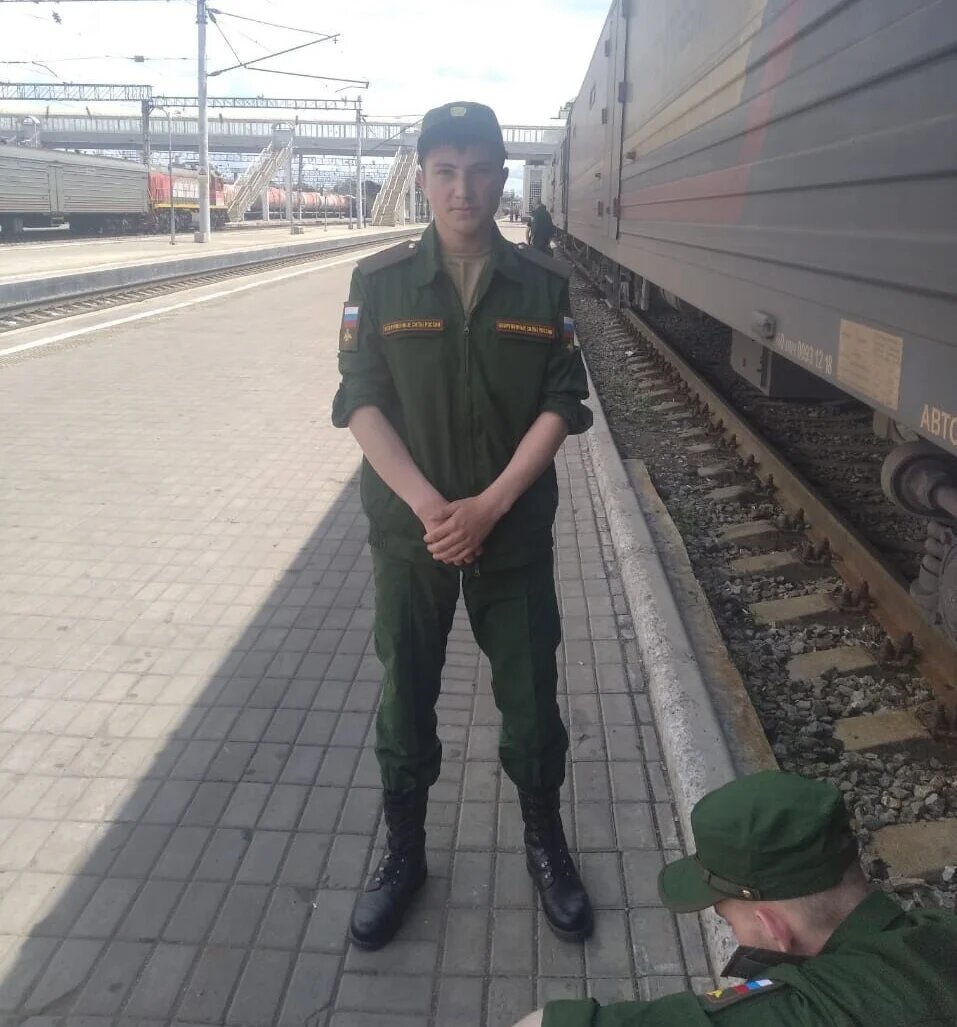
Alexey. A photo from the family archive
The death
“Alexey’s grandma felt that he was gone. When we lost contact with him on 14 April, she was so worried. She called his unit on the 20th. Of course, no one told her anything,” Tatyana said.
Their echelon left Ussuriysk on 4 March. It took them nearly two weeks to reach their destination. Alexey called his family three times while they were on the road: “We’re on our way, everything’s fine, they aren’t telling us where we’re going.”
The next time he called his family was on 17 March. “He said they were allowed to call their families before they were sent to Belarus: there would be no phones and no service there. He said he would call us when he got the chance,” Tatyana recalls.
Alexey’s family had heard nothing from him for over three weeks since then. On 10 April, Tatyana got the number of the Russian Defence Ministry hotline that families could use to find missing soldiers. They called the hotline, and the army officials told them that Alexey was fine, he was alive. On the same day, when it was about 11 p.m. in the Amur region (GMT+9), Alexey called his relatives himself. “He sounded fine, he said everything was alright. He didn’t tell us where they were, he didn’t know it himself. The phone call lasted a minute. He called his mum for a minute and his grandmother for a minute. I guess he wasn’t allowed more time,” Tatyana says.
Six hours later he sent his aunt a message:
“If there is hell on earth, we are here.
I’m still alive, but not for long, it seems.
Help me.”
![A screenshot of Alexey’s conversation with his aunt Tatyana on Telegram.
10 April
Tatyana [11:36]: Hi! Can you text us here?
Alexey [22:36]: Fuck, it’s a fucking mess. They fucking lied to us. If there is hell on earth, we are here.
Alexey [22:38]: i’m still alive but not for long it seems
Alexey [22:40]: help me
11 April
Tatyana [08:59]: Alexey, what’s going on, you told me it was fine 😭
14 April
Tatyana [18:46]: Hi( granny says you called her today, how are you? are you ok 😘😘😘](https://novayagazeta.eu/static/records/49dc2b17aa404068bc72f137cc952047.jpeg)
A screenshot of Alexey’s conversation with his aunt Tatyana on Telegram.
10 April
Tatyana [11:36]: Hi! Can you text us here?
Alexey [22:36]: Fuck, it’s a fucking mess. They fucking lied to us. If there is hell on earth, we are here.
Alexey [22:38]: i’m still alive but not for long it seems
Alexey [22:40]: help me
11 April
Tatyana [08:59]: Alexey, what’s going on, you told me it was fine 😭
14 April
Tatyana [18:46]: Hi( granny says you called her today, how are you? are you ok 😘😘😘
It was late at night in the Amur region, so Tatyana only saw this message early in the morning on 11 April.
“But you told me everything’s fine?” she texted him immediately, but got no response. She did not tell anyone about this terrifying message except her husband.
They called the hotline again, and on 14 April, Alexey called his grandma from his friend’s phone. He said everything was fine, and that they were on their way to the forest area for “some kind of special operation”. He asked his grandmother to call the mother of his friend Dmitry, or Dima for short, who was not able not reach her. Alexey said that although Dima had already served a year of conscript service, he was still forced to sign a contract.
Alexey’s family never heard from him again. Alexey was killed on 20 April. They later found out that on the day he got killed, he seemed to have felt that this might be his last battle and wrote farewell letters to his family. The letters started with the words: “My dear ones…” Danila, one of Alexey’s fellow soldiers, later told his family about the letters that he saw him write. He recalled what the letters said to Tatyana: Alexey wrote that he was going into battle on that day, that he was very scared, he hoped that everything would be fine, he loves them all very much. He listed off the names of his relatives and his girlfriend Zhenya.
8 May
Tatyana [16:10]: Hello! This is Alexey’s aunt. Dmitry told me that you read the letters he wrote, maybe you remember what they said
Danila (Tatyana has his contact saved as Mishutin 👌🏻 — translator’s note) [16:55]: Hello, I didn’t read them very well, but I remember the beginning a little
Danila [16:59]: I only saw that they brought his military ID, there were two notes there
Danila: They said, my dear ones, today I am going into battle, I am very scared, I hope everything will be fine, he said he loves all of you, there was your name there, also his girlfriend Zhenya I think, he said he loves you all very much
Alexey’s fellow servicemen said that he had put the letters inside his military ID (a Russian military ID has the form of a small booklet — translator’s note). However, neither the letters nor his phone were among the things given to Alexey’s family after his death.
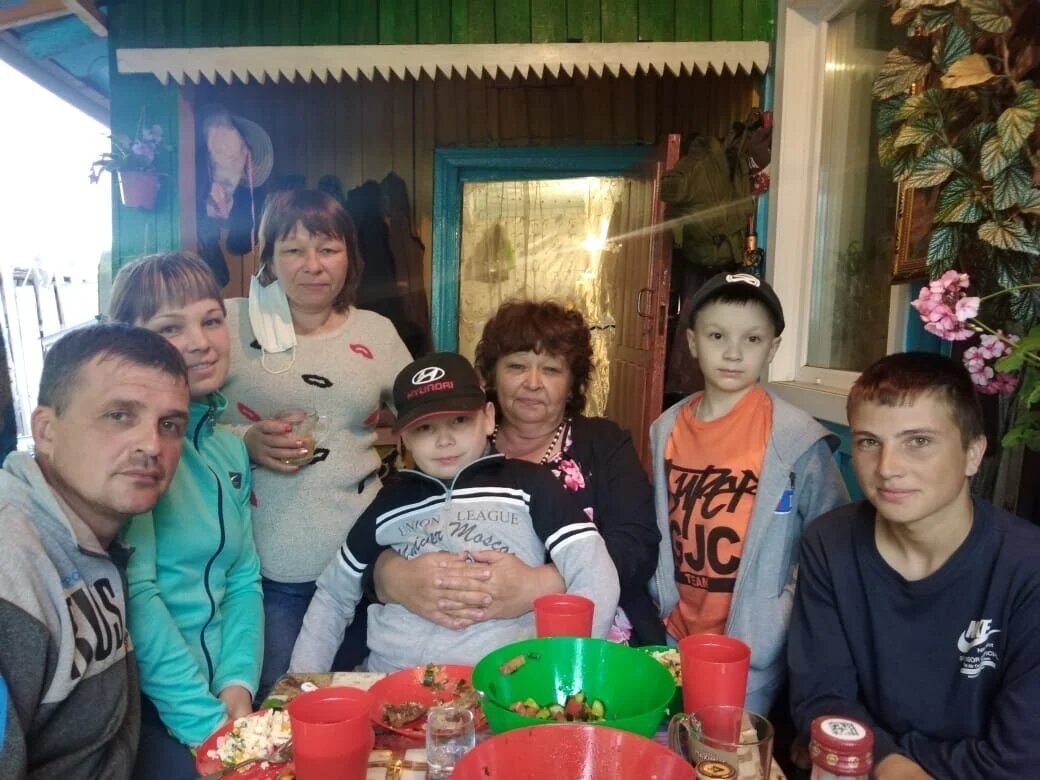
Alexey (on the right) and his family. A photo from the family archive
The funeral
“During a mortar attack, he was fatally wounded and died on the scene… in the area of the Novodarivka village, Huliaipilskyi district, Ukraine,” Tatyana reads from the army’s death notification. It is not stated that the district is located in Ukraine’s Zaporizhzhia region.
The family was notified of Alexey’s death on 27 April. Alexey Prokhorov, the head of the Skovorodinsky district where the soldier’s home village is located, as well as deputy head of the village Timofeev came to visit his family to give them the devastating news.
“My sister [Alexey’s mother] asked if there could be a mistake. They told her that it’s definitely him, they checked five times,” Tatyana recalls.
The officials did not tell the family when Alexey’s body would be delivered to them. They told them to wait. They also promised the family to help them with everything: “Prokhorov told my sister that we could visit the cemetery and point to a place we liked, and they would dig the grave there. They said they would do it and pay for everything.”
The family was told several times that they would be reimbursed for the funeral costs. But this turned out to be not quite true.
In late April, Tatyana and Irina’s older sister Maria Perova visited the local administration to find out how the funeral would be organised and when they would dig the grave. “Dig it yourself, we don’t have anyone who could do it,” was the response.
“She’s a single mother, she doesn’t have any other relatives except us, her sisters. You promised yourself that you would do everything, that we just have to point to a place. And they told me: ‘We’re not a funeral home!’” Maria recalls the conversation she had with the village administration.
The local officials made it clear that they would not pay for the wake either.
On the day they were told that the plane transporting Alexey’s body landed at an airfield in Seryshevo, located over 300 miles away from Skovorodino, the administrative centre of a district where Alexey’s home village is, Maria and her sister’s husband went to a funeral home to pick out a coffin. “We chose a coffin, we bought a wreath, the one that we liked, for an army soldier. It came up to about 15,000 rubles [€238]. But they charged us 52,000 [€827]! Turns out that they charged us 35,000 [€556] for transporting the body from the airfield to Skovorodino,” Maria says.
On their way back, they called the mayor of Yerofey Pavlovich to find out if they could transport the body from Skovorodino to the village. “He told us that they would give us a car, but only in Yerofey, at the cemetery,” Maria stated. Alexey’s family had to pay another 10,000 rubles (€155) for “delivering” the body from Skovorodino to their village.
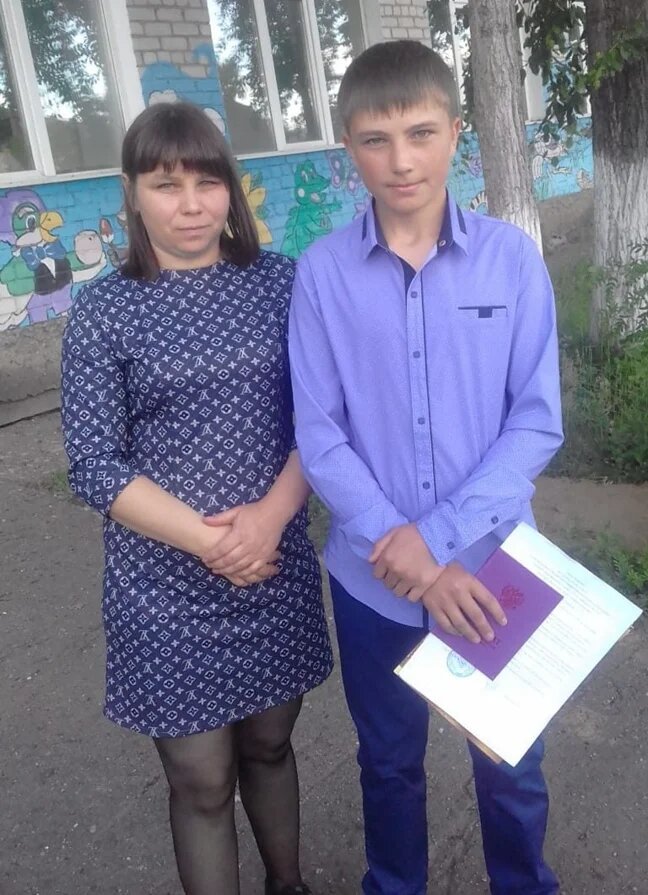
Alexey and his mother at his middle school graduation. A photo from the family archive
In total, the family had to pay 62,000 rubles (€960) just for the wreath and coffin and for transporting the body to the village. (The average monthly salary in Skovorodino reaches 43,000 rubles (€670) in 2022, the data provided by BDEX portal suggests — translator’s note).
On the day of the funeral, Alexey’s family visited the local administration once again to apply for financial aid. They were asked to date their application 29 April. The administration offered the family 90,000 rubles (€1,400). “They told us, here’s 90,000, that will be enough to cover the wake, too. What wake, should we just open a bottle of vodka at the cemetery?” Maria scoffs. She points out that it was the local administration that told them they would cover everything, and then they went back on their word, claiming that Alexey “signed a contract, after all.”
“Yes, he did! But he fought for Russia! He wasn’t stabbed while staggering drunk in the street somewhere!” Maria exclaims.
On 5 May, Alexey’s body was brought to the village community centre. He was lying in an open casket: his face was left intact. The funeral took place on the same day. The sisters’ husbands dug the grave themselves the day before. Their friends from work made the fence for free.
The entire village came to pay their respects to Alexey. According to Wikipedia, the village population reaches 4,300 people, mainly Russians and Ukrainians.
Tatyana says that many people who knew Alexey, an easy-going handsome young guy who was always smiling, attended the funeral. Many people who did not know him came to pay their respects as well. The regiment sent an honour guard to the cemetery. Head of the Skovorodino district Prokhorov made a speech at the funeral. Alexey’s grave was drowning in flowers. Many people noticed a group of five sobbing women: the mothers of other young Russian soldiers sent to Ukraine.
In late June, Tatyana told us that Alexey’s friend Dima had come home. Alive. He managed to break his contract and leave the army by filing a request to the military prosecution’s office with the help of his family.
Alexey was awarded the Order of Courage posthumously. There were no reports of his death in the media. Local veterans planned to install a commemorative plaque in Alexey’s honour at his school timed to Russia Day (12 June — translator’s note), but the event was postponed until September.
Alexey leaves behind his mother Irina and his younger brother Yegor, who will turn fourteen in December. His family asked us not to contact Irina to let her grieve in peace.
Join us in rebuilding Novaya Gazeta Europe
The Russian government has banned independent media. We were forced to leave our country in order to keep doing our job, telling our readers about what is going on Russia, Ukraine and Europe.
We will continue fighting against warfare and dictatorship. We believe that freedom of speech is the most efficient antidote against tyranny. Support us financially to help us fight for peace and freedom.
By clicking the Support button, you agree to the processing of your personal data.
To cancel a regular donation, please write to [email protected]
